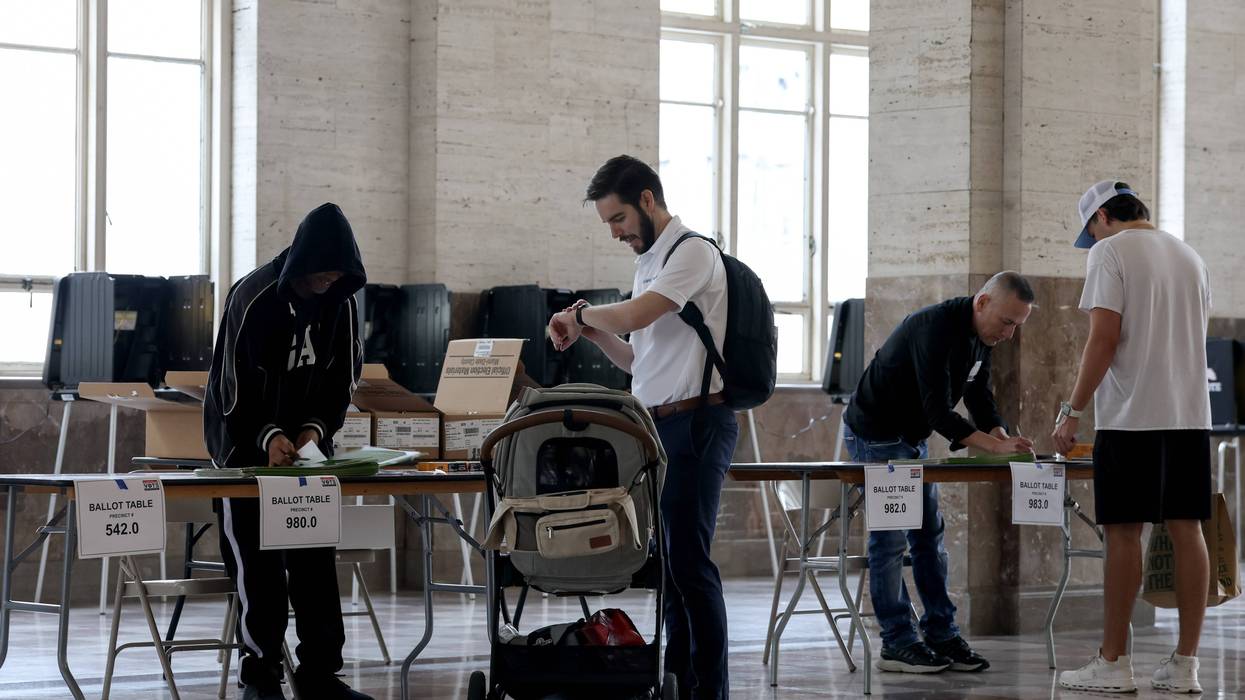June, 07 2010, 10:46am EDT
For Immediate Release
Contact:
Trina Tocco, International Labor Rights Forum (USA), + 1 269 873 1000, trina.tocco@ilrf.org
World Cup Soccer Balls Missed the Goal Set 13 Years Ago: Child Labor, Poverty Wages, Temporary Workers
As excitement grows for the
upcoming FIFA
World Cup beginning shortly in South
Africa, there is a part of the World Cup
that many sports fans will not see. The workers stitching soccer balls
in
Pakistan, India, China
and Thailand
continue to experience alarming labor rights violations even 13 years
after the
soccer ball industry signed the "Atlanta Agreement" committing to
clean up the industry.
WASHINGTON
As excitement grows for the
upcoming FIFA
World Cup beginning shortly in South
Africa, there is a part of the World Cup
that many sports fans will not see. The workers stitching soccer balls
in
Pakistan, India, China
and Thailand
continue to experience alarming labor rights violations even 13 years
after the
soccer ball industry signed the "Atlanta Agreement" committing to
clean up the industry. The
International
Labor Rights Forum (ILRF) released a new report titled "Missed
the Goal for Workers: the Reality of Soccer Ball Stitchers in
Pakistan, India,
China and Thailand" today.
The research found that the decade-long effort by governments,
companies, and
other stakeholders to eliminate child labor in this industry has seen
only
limited success. Child labor still exists in soccer ball production in
India and Pakistan.
"Even after all of these
years, low wages and a
dangerous working environment in the industry remain almost entirely
unaddressed," reports Bama Athreya, Executive Director of the International
Labor Rights
Forum. "It's time for buyers, factories and
industry associations such as FIFA to take responsibility for continued
labor
rights violations in the production of soccer balls."
The report highlights that:
-
More than half of the 218
surveyed
workers in Pakistan
reported that they did not make the legal minimum wage per month. -
In one Pakistani
manufacturer, ILRF
researchers found that all interviewed stitching center or home based
workers
were temporarily employed resulting workers not having access to
healthcare or
social security. -
In the same Pakistani
manufacturer's supply chain, female home-based workers faced
discrimination based on their gender. They were paid the least and faced
the
possibility of losing their jobs permanently due to pregnancy. -
In one Chinese factory,
workers were
found to work up to 21 hours a day during high seasons and without one
day off
in an entire month. -
Indian stitching centers
were
described as "pathetic." Proper drinking water or medical care
facilities, and even toilets were often absent. -
Child labor was identified
by
workers producing for three different factories in Pakistan.
ILRF is calling on the
soccer ball
industry to take immediate action to address the issues of extremely low
wages
and proliferation of temporary workers to improve conditions for the
workers
who produce the balls at the center of the 2010 World Cup.
The report will be
available on June
7, 2010 at: https://www.laborrights.org/stop-child-forced-labor/foulball-campaign/resources/12331.
ILRF is an advocacy organization dedicated to achieving just and humane treatment for workers worldwide. ILRF serves a unique role among human rights organizations as advocates for and with working poor around the world. We believe that all workers have the right to a safe working environment where they are treated with dignity and respect, and where they can organize freely to defend and promote their rights and interests.
LATEST NEWS
Florida Republicans Ripped for Advancing Show-Me-Your-Papers Voter ID Bill
"This wave of anti-voter legislation is advancing amid ongoing abuses of power that pose unprecedented threats to American democracy," said the ACLU of Florida's executive director.
Feb 25, 2026
With 251 days until the US general election, Florida Republicans on Wednesday passed a show-me-your-papers bill that opponents warn could prevent thousands of eligible state voters from registering if they don't have a valid birth certificate or passport, or their documents don't reflect a name change.
"Midterm elections are coming later this year—and they're a crucial test of our democracy," ACLU of Florida executive director Bacardi Jackson said in a Wednesday statement. "Moments like this bring new voters into the process and give communities the power to hold leaders accountable—exactly what a healthy democracy demands. But right now, some lawmakers are pushing an anti-voter bill that could shut thousands of eligible people out of our elections and discourage the enrollment of new eligible voters."
The Florida House of Representatives on Wednesday voted 83-31 on HB 991, sponsored by Rep. Jenna Persons-Mulicka (R-78).
"The Florida House version of the bill would only go into effect in January 2027. But under a similar bill set for consideration in the Florida Senate, the new rules would take effect this July, before the November midterm elections," Democracy Docket detailed. "A House committee already gave preliminary approval to the bill earlier this month."
Jackson highlighted that "many eligible voters don't have ready access to an unexpired passport or an original or certified copy of their birth certificate because of logistical and financial barriers. More than 8 million Floridians do not have a valid passport, and because many women legally change their name upon marriage, more than 4.7 million women in Florida do not have a birth certificate reflecting their current legal name—documents this bill would require."
"At the same time, this proposal would eliminate current, valid forms of ID proving eligibility at the polls, including student IDs, retirement center IDs, and public assistance IDs," she warned. "Taken together, these changes are not neutral or harmless—they would fall hardest on low-income voters, students, seniors, women, and Black and brown Floridians."
The ACLU leader also argued that "context matters. This wave of anti-voter legislation is advancing amid ongoing abuses of power that pose unprecedented threats to American democracy." She specifically pointed to the Safeguard American Voter Eligibility (SAVE) America Act that the GOP-controlled US House of Representatives passed earlier this month.
"We're seeing parallel efforts nationally to make it harder for eligible voters to cast their ballots—including the SAVE Act being debated in Congress right now—and Florida is leading the way down this authoritarian path," she said. The federal bill is less likely to get through the US Senate, whose filibuster rule requires the GOP to get some Democratic support to advance most legislation.
"What makes this even more galling is that lawmakers don't have to do any of this at all—they are choosing to," said Jackson. "They could enact reforms making it easier for eligible Floridians to vote and have their voices be heard, like the Harry T. and Harriette V. Moore Florida Voting Rights Act, HB 1419/SB 1598. Instead, they are fast-tracking legislation that would make voting harder for eligible Floridians and silence communities that deserve to be heard."
"We will not stand by while politicians in power seek to entrench their power at the expense of the people's rights," she vowed. "We will keep organizing and fighting to reclaim and defend our democracy—because every eligible Floridian deserves to vote."
Meanwhile, at the federal level, Senate Majority Leader John Thune (R-SD) plans to hold a vote on the SAVE America Act this week. President Donald Trump used his State of the Union address on Tuesday night to increase pressure on Congress to send the bill to his desk.
"I'm asking you to approve the SAVE America Act to stop illegal aliens and others who are unpermitted persons from voting in our sacred American elections—that cheating is rampant in our elections," Trump said. "It's very simple: All voters must show voter ID. All voters must show proof of citizenship in order to vote. And no more crooked mail-in ballots except for illness, disability, military, or travel. None."
Experts have long countered such GOP claims by emphasizing that, as the Brennan Center for Justice put it in a pair of blog posts, "noncitizen voting is already illegal" and "extensive research reveals that fraud is very rare."
Michelle Kanter Cohen, policy director and senior counsel for the national voting rights group Fair Elections Center, told Democracy Docket on Wednesday that Florida's voter suppression bill "would do a lot of the same things," as the SAVE America Act, "in terms of preventing American citizens from voting who don't have access to documentary proof of citizenship documents."
"The last thing someone who is on a path to citizenship would want to do is to jeopardize their naturalization by voting illegally," Kanter Cohen said. "And so people don't do that. That's not something that's happening because it has such dire consequences."
Keep ReadingShow Less
'Despicable': Vance, Oz Announce Freeze on Some Medicaid Funding for Minnesota
"The Constitution clearly gives Congress the power to spend taxpayer funds, and no law allows the president to halt if he feels some US states aren’t being 'good stewards' of the money," said one critic.
Feb 25, 2026
US Vice President JD Vance said Wednesday that the Trump administration will pause some Medicaid funding for Minnesota over fraud concerns—without offering any guarantees that the suspension will not adversely impact the more than 1 million Minnesotans who depend upon the key healthcare program.
"We're announcing today that we have decided to temporarily halt certain amounts of Medicaid funding that is going to the state of Minnesota in order to ensure that the state of Minnesota takes its obligations seriously to be good stewards of the American people's tax money," Vance said at a White House press conference with Centers for Medicare and Medicaid Services (CMS) Administrator Mehmet Oz.
"Now what is this gonna mean?" Vance continued. "What this means is that, first of all, the providers on the ground in Minnesota have actually already been paid... What we're doing is we are stopping the federal payments that will go to the state government until the state government takes it obligations seriously to stop the fraud that's being perpetrated."
They already targeted SNAP in Minnesota. They’ve killed two Minnesotans and injured or kidnapped hundreds more. Now they’re stealing their Medicaid. They’re going to deny people healthcare because of a YouTube video about a Somali daycare scam that wasn’t even true.
[image or embed]
— Kelly (@broadwaybabyto.bsky.social) February 25, 2026 at 3:05 PM
Oz demanded that Democratic Minnesota Gov. Tim Walz determine "who these providers are; make sure they're not already in trouble for doing bad stuff, and then reevaluate all the current providers to make sure they're supposed to be able to provide these services."
Responding to Oz's remarks, Gaia Leadership Project founder Elizabeth Cronise McLaughlin said on Bluesky, "So Minnesota is supposed to review every appointment by a Medicaid recipient with every doctor to get funds already lawfully allocated to the state?"
Asked by a reporter how he intends to ensure that the funding pause "doesn't impact the people who are enrolled in Medicaid," Vance said he is "worried about the justice of it all."
"I think it's offensive that American taxpayers pay into these programs and they're defrauded... and it's really sad that American children who need these services are unable to get them, because they're going to fraudsters," Vance replied.
"Look, we're certainly gonna make sure that our anti-fraud efforts go after the fraudsters and not after anybody who actually benefits from these services," he continued. "But I actually think the question is a little off, in a way, because the problem is not going after the fraud, the problem is that these programs are being defrauded to begin with."
"Our social safety net will disappear unless we take fraud more seriously," added the vice president, whose boss, President Donald Trump, last year signed into law the biggest cuts to Medicaid and the Supplemental Nutrition Assistance Program, or SNAP, in the nation's history as part of the One Big Beautiful Bill Act.
Medicaid is the primary healthcare safety net for lower-income Americans, with nearly 70 million people enrolled nationwide at the end of last year.
While federal prosecutors are investigating Minnesota’s Medicaid system—specifically, 14 high-risk service programs such as housing support and personal-care services—on suspicion of billions of dollars in fraudulent billings since 2018, and dozens of people have been convicted of stealing public money through the state’s social services system, critics noted that Congress, not the president, has the power of the purse.
Some observers noted that Trump has already targeted Minnesota—which voted against him all three times he ran for president—with his deadly crackdown on undocumented immigrants and their defenders and racist attacks on Somali immigrants, including Congresswoman Ilhan Omar (D-Minn.).
The Medicaid freeze follows the Trump administration's $10 billion cut in federal childcare funding to five Democrat-led states, including Minnesota, last month—a move that opponents argue punishes working families who committed no fraud.
University of Illinois professor Nicholas Grossman called the Medicaid pause "taxation without representation."
"The Constitution clearly gives Congress the power to spend taxpayer funds, and no law allows the president to halt if he feels some US states aren’t being 'good stewards' of the money," he said on Bluesky. "In case there’s any confusion on this, the Impoundment Control Act forbids it."
"The people of Minnesota vote for representatives to Congress," Grossman added. "Minnesota representatives and senators were in DC, representing their constituents, when Congress passed laws using proper procedure that allocated Medicaid funding. The president breaking those laws violates the fundamental compact of the republic."
Oz on Wednesday also announced "a six-month national moratorium blocking all new enrollments for durable medical equipment—prosthesis, orthotics—supplies across the board" in the name of fighting fraud. The move targets suppliers, not individual Medicaid beneficiaries.
This from Oz, a promoter of privatized Medicare Advantage programs, which are notorious for overcharging taxpayers and denying patients necessary care. The CMS under Oz increased federal funding for Medicare Advantage plans by more than $25 billion for 2026.
As Common Dreams recently reported, United Health Group (UHG), one of the country's largest for-profit health insurance companies, has been the leading beneficiary of a long-running Medicare Advantage fraud scheme that the Medicare Payment Advisory Commission—an independent, nonpartisan legislative branch agency—warned could cost US taxpayers $1.2 trillion over the next decade.
Some critics said that if Trump really cared about fraud, he'd go after companies like UHG—and stop pardoning so many convicted criminals who committed billions of dollars worth of fraud.
"These guys are despicable," Michigan State University professor Brendan Cantwell said Wednesday in response to Vance and Oz's announcement.
Robert Weissman, co-president of the consumer advocacy group Public Citizen, said in a statement Wednesday that “Medicaid fraud is a serious problem that requires cracking down on fraudsters—not patients."
Weissman continued:
This administration’s anti-fraud rhetoric is itself a fraud. In fact, the administration has gutted anti-fraud government agencies and programs and let fraudsters off the hook. It has issued record-breaking pardons to fraudsters; sought to eliminate the most important anti-consumer fraud agency, the Consumer Financial Protection Bureau; eviscerated the corps of inspectors general whose job is to root out waste, fraud, and abuses; and dropped dozens of fraud and fraud-related investigations against large corporations.
“The Trump administration suspension of Medicaid funding in Minnesota is a bad-faith, punitive, and shameful measure that will punish people in Minnesota as part of the same deceptive story that the Trump administration has told to justify the outrageous [Immigration and Customs Enforcement] invasion of the state," Weissman added.
Keep ReadingShow Less
Former Brazilian Political Officials Found Guilty of Plotting Murder of Marielle Franco
"What the killers did not expect is that her legacy would become greater than all of this," said Brazilian Supreme Court Justice Carmen Lúcia.
Feb 25, 2026
A five-judge panel on Brazil's Supreme Court on Wednesday voted unanimously to convict former Congressman Chiquinho Brazão and his brother, politician Domingos Brazão, of ordering the 2018 murder of Rio de Janeiro City Councilwoman Marielle Franco and her driver, Anderson Gomes.
As reported by Reuters, the court sentenced the Brazão brothers to each serve 76 years in prison for plotting to assassinate the 38-year-old Franco because they feared she and her allies in the Socialism and Liberty Party would be an impediment to their illegal scheme that involved taking public lands to develop private real estate projects.
Justice Alexandre de Moraes, who oversaw the trial of the brothers, said that the two men did not think they would be held accountable for killing Franco because she was a Black woman who represented a poor neighborhood in Rio.
"Inside the misogynistic, prejudiced minds of those who ordered and carried out the crime, who would care about that?" Moraes said. “They did not expect such wide repercussions."
Justice Carmen Lúcia also said that the Brazão brothers seemed to believe that they would be allowed to get away with murder.
"What the killers did not expect," said Lúcia, "is that her legacy would become greater than all of this."
The court also sentenced former Rio de Janeiro Police Chief Rivaldo Barbosa to an 18-year prison sentence for obstructing the investigation into Franco's murder.
Franco's widow, current Rio City Councilwoman Mônica Benício, told Payday Report that the court's conviction of the plotters was a landmark decision for Brazilian democracy.
"For the country, this is an opportunity to demonstrate its capacity to break with the selective penal system that protects criminal structures and their political ties," Benício said. "We must learn a lesson from what the assassination of Marielle and Anderson reveals about Brazil: the obscure connections between crime, politics, and the police."
Anielle Franco, a sister of Marielle Franco who currently serves as Brazil's Minister of Racial Equality, hailed the verdict as "justice" in a social media post, vowing that "our fight continues for all victims of violence."
Agnes Callamard, secretary general of Amnesty International, said that justice for Franco and Gomes was "a long time coming," and added that "their killings are emblematic of the broader and highly alarming trend of lethal violence and structural racism against human rights defenders in Brazil."
Keep ReadingShow Less
Most Popular


